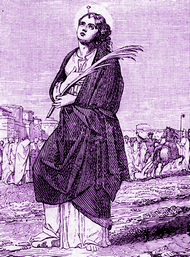Lives of the Saints
Our Models and Protectors
Spiritual Bouquet:
April 16

Saint Engratia and
her Eighteen Companions
Virgin, Martyr
(† 303)
The church celebrates on this day the triumph of Saint Engratia, a virgin martyr who was a native of Portugal. Her father had promised her in marriage to a man of quality in Rousillon, Gaul, and to accompany her there, he sent as her escort for the marriage her uncle Lupercius and a brilliant suite of sixteen other noblemen, as well as a servant named Julie.
When they arrived at Saragossa, she learned of the horrible massacre of Christians being carried on at that time, and of the torments they were enduring at the hand of Dacian, who governed that region in the name of the emperors Diocletian and Maximian. Inspired with a divine heroism, she resolved to attempt to change his dispositions, or if she could not do so, to take part herself in the glory of these generous soldiers of Christ, and mingle her blood with theirs.
She obtained an audience with the persecutor. Saying she was moved with compassion for her brethren who, despite their innocence, were being slain without mercy, she asked him, How can you shed the blood of so many persons who have done nothing but adore the true God and despise vain idols? Dacian, hearing her gentle reproaches, immediately had her imprisoned and sought out her companions, whom he also cast into prison. They affirmed at his tribunal that they too were Christians, and all were cruelly scourged. Saint Engratia was subjected to the most cruel and barbarous torments; abandoned in prison, she died of her wounds which festered there. Her death occurred in April of the year 303.
Saint Lupercius, with the seventeen nobles and Julie, had already been decapitated. Dacian, still not satiated with blood, massacred great numbers of other Christians of Saragossa who are honored on November 3rd under the title of the Countless Martyrs of Saragossa. Their bodies were burned with those of several malefactors, imprisoned at the same time, but it is said that the ashes of the martyrs separated and formed a lot apart, called the masse blanche.
The relics of Saint Engratia, who was buried by the Christians of Saragossa, have always been held in high honor in Spain, at Saragossa in particular.
Reflection. Men do not pursue in a haphazard manner temporal goods, or by fits and starts. Let us be just as punctual and orderly in the service of God, not searching for new paths but perfecting our ordinary devotions. If we persevere in these, Paradise is ours.
Les Petits Bollandistes: Vies des Saints, by Msgr. Paul Guérin (Bloud et Barral: Paris, 1882), Vol. 4; Little Pictorial Lives of the Saints, a compilation based on Butler's Lives of the Saints and other sources by John Gilmary Shea (Benziger Brothers: New York, 1894).